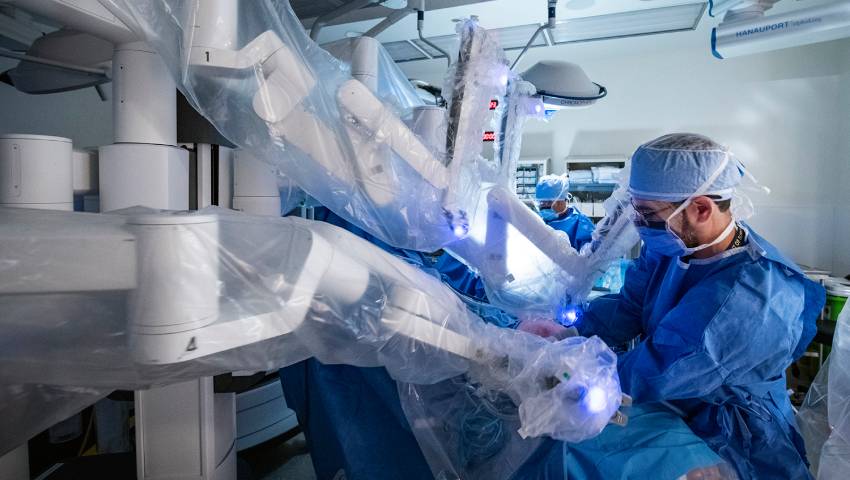
- 03/11/2025
- Dr. Srivatsan Gurumurthy
- 0 Comments
- Blog
Robotic Surgery for Rectal Cancer: Benefits Explained
By Dr. S. Srivatsan Gurumurthy, Robotic & GI Cancer Surgeon, Chennai
Rectal cancer is a complex condition that demands precise and advanced surgical management. Over the years, surgical techniques have evolved significantly—from open surgery to laparoscopic and now robotic-assisted surgery. Among these, robotic surgery has emerged as a game-changer, especially for rectal cancer, offering unmatched precision and better patient outcomes.
As a Robotic and Gastrointestinal Cancer Surgeon in Chennai, I have witnessed how robotic technology has transformed rectal cancer care, making surgery safer, more accurate, and less traumatic for patients. Let’s explore the key benefits of robotic surgery for rectal cancer.
- Enhanced Precision and Control: Robotic surgery provides the surgeon with 3D high-definition visualization and magnification of the surgical site. The robotic arms can mimic the natural movement of the human wrist, but with a much greater range of motion. This precision allows for delicate dissection in the narrow pelvic cavity, where rectal cancer surgery can be most challenging.
- Better Nerve Preservation: One of the most significant advantages of robotic surgery in rectal cancer is nerve preservation. During traditional open or laparoscopic surgeries, it can be difficult to protect the fine pelvic nerves responsible for bladder, bowel, and sexual functions. The superior visualization and dexterity of the robotic system help preserve these vital nerves, improving postoperative quality of life.
- Reduced Blood Loss and Pain: Robotic surgery is minimally invasive, which means smaller incisions, less tissue trauma, and minimal bleeding. Patients typically experience less postoperative pain and require fewer pain medications compared to open surgery.
- Faster Recovery and Shorter Hospital Stay: Because robotic surgery involves smaller incisions and minimal muscle damage, patients recover faster and can return to their normal activities much sooner. Most patients are discharged within a few days and experience a quicker return to bowel function.
- Lower Risk of Complications: With robotic assistance, surgeons can perform highly controlled movements, reducing the risk of accidental injury to nearby organs and tissues. The improved precision also leads to fewer infections, reduced blood loss, and faster wound healing.
- Better Cancer Clearance (Oncological Outcomes): Robotic systems allow for meticulous removal of cancerous tissues with clear margins while safeguarding healthy structures. This contributes to better cancer control, fewer recurrences, and improved long-term outcomes. The robotic platform enables accurate total mesorectal excision (TME)—a key step in rectal cancer surgery.
- Ideal for Complex and Obese Patients: In patients with a narrow pelvis, obesity, or large tumors, conventional laparoscopic surgery may pose technical challenges. Robotic surgery overcomes these limitations, providing better ergonomics and surgical reach, even in difficult cases.
- Improved Surgeon Comfort and Reduced Fatigue: Unlike traditional surgery, robotic systems allow the surgeon to operate from a comfortable seated console, enhancing concentration and precision during long procedures. This ultimately benefits the patient through more stable and accurate surgical performance.
Conclusion:
Robotic surgery represents the future of rectal cancer treatment. It combines the advantages of minimally invasive techniques with cutting-edge technology, ensuring precision, safety, and faster recovery.
As a Robotic Gastrointestinal Cancer Surgeon at GEM Hospital, Chennai, I believe robotic-assisted rectal cancer surgery is one of the most significant advancements in colorectal cancer care. It not only improves surgical outcomes but also enhances the patient’s postoperative quality of life. If you or your loved one has been diagnosed with rectal cancer, it’s important to discuss all available treatment options, including robotic surgery, with your specialist.
